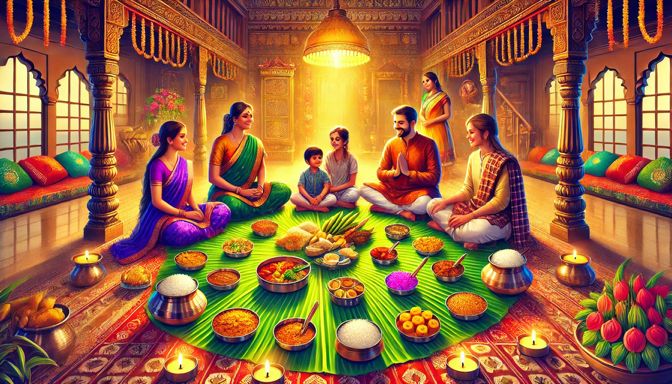Good Manners and Etiquette: ‘Vedic Shishtachar’ in Vedic Times

Vedic Shishtachar is not just a historical term—it is a vibrant focus keyword that encapsulates the ancient principles of good manners and etiquette as practiced in the Vedic era. The rich heritage of India is deeply rooted in these traditions, where Vedic Shishtachar formed the foundation of an ideal society. From the very beginning, this concept intertwined with dharma (moral duty) and the natural order, guiding human behavior to align with the cosmos.
The Vedic civilization placed great emphasis on virtues such as humility, respect, truthfulness, and non-violence. These principles, known collectively as Vedic Shishtachar, were not mere rituals but a way of life. They formed the ethical backbone of a prosperous and peaceful community, ensuring personal growth and societal harmony. This article explores the profound wisdom of Vedic etiquette, its daily practices, and its modern relevance.
At the heart of Vedic Shishtachar lies the belief that one’s behavior should mirror one’s inner values. The emphasis was on personal transformation as well as collective well-being. By integrating these age-old teachings into everyday life, individuals could contribute to a more compassionate society.
The Essence of Vedic Shishtachar in Vedic Times
The term Vedic Shishtachar is derived from Sanskrit, where ‘shishta’ means “disciplined” or “well-mannered,” and ‘achar’ means “conduct.” In the Vedic era, shishtachar was a reflection of one’s inner character, social, moral, and spiritual values. It represented a perfect balance between personal duties and collective harmony, urging individuals to act responsibly while contributing to the welfare of society.
Key Elements of Vedic Shishtachar
1. Respect for Elders and Teachers (Guru-Shishya Parampara):
The Guru-Shishya tradition was the heart of Vedic education. Teachers (gurus) were revered as spiritual guides, while students (shishyas) demonstrated humility by bowing before them and dedicating themselves to learning. This mutual respect laid the foundation for both academic and moral development.
2. Ahimsa (Non-Violence):
Ahimsa in Vedic Shishtachar went beyond physical non-violence to encompass non-violence in speech, thoughts, and intentions. It fostered compassion and instilled a culture of peace and mutual respect among all living beings.
3. Hospitality (Atithi Devo Bhava):
The principle of “Atithi Devo Bhava” (The guest is like God) was central to Vedic etiquette. Guests, irrespective of their social status, were treated with honor and care, ensuring an inclusive and kind society.
4. Respect for Nature and Sustainability:
Nature held a sacred place in Vedic culture. Elements such as rivers, mountains, and trees were considered divine. Daily prayers and rituals were dedicated to preserving the natural balance, making sustainable living an integral part of Vedic Shishtachar.
5. Politeness and Truthfulness:
Truth (satya) and kind communication (madhura vachana) were highly valued. Honesty and transparency in interactions built trust and laid the groundwork for strong personal and societal relationships.
Daily Practices Reflecting Bhartiya Shishtachar

1. Morning Rituals (Dinacharya):
Dinacharya, or the daily routine, played a crucial role in cultivating discipline and mindfulness. Practices such as waking up during Brahma Muhurta, bathing, and offering prayers (like Surya Namaskar) instilled self-discipline and gratitude, setting a positive tone for the day.
2. Eating Habits:
In the Vedic era, the act of eating was revered as a sacred ritual. Food was first offered to the divine through annapurna stuti before consumption. This practice, coupled with eating in silence, encouraged mindfulness and fostered equality and compassion among individuals.

3. Dress and Presentation:
The Vedic people embraced simplicity, modesty, and cleanliness. They typically wore white or natural-colored garments, symbolizing purity and humility. This aspect of Vedic Shishtachar promoted not only physical but also spiritual cleanliness.
4. Social Interactions:
The traditional greeting “Namaste,” meaning “I bow to the divine in you,” was a cornerstone of Vedic etiquette. It reflected humility and mutual respect, strengthening community bonds through regular social interactions and ritualistic gatherings.
5. Practices of Selfless Service (Seva):
Selfless service was another critical component of Vedic Shishtachar. Helping others without expecting anything in return, as well as acts of charity and community service, were viewed as pathways to spiritual growth and societal improvement.
Additional Vedic Principles of Shishtachar
1. Dharma and Duty:
Every individual was expected to fulfill their societal role, whether as a student, householder, or ascetic. This sense of duty—dharma—emphasized ethical living and fostered a responsibility toward family, society, and nature.
2. Rituals and Festivals:
Rituals like yajnas (sacrificial ceremonies) and numerous festivals celebrated cosmic harmony and reinforced community spirit. These practices not only strengthened social bonds but also deepened the connection between humans and the divine.

3. Focus on Inner Growth (Yoga and Meditation):
Yoga and meditation were integral to achieving self-realization and inner peace. These practices nurtured emotional intelligence, improved concentration, and played a significant role in maintaining overall well-being—a timeless lesson of Vedic Shishtachar.
Modern Relevance of Vedic Shishtachar
In the 21st century, the age-old principles of Vedic Shishtachar offer timeless wisdom to help us navigate modern challenges. Today, these practices are more relevant than ever in fostering personal growth, community well-being, and environmental sustainability.
- Strengthening Family Bonds: Showing respect for elders and maintaining open lines of communication can heal and strengthen family relationships.
- Environmental Conservation: The deep reverence for nature as seen in Vedic traditions inspires sustainable living practices essential for our planet.
- Mindful Living and Wellness: Incorporating practices such as yoga, meditation, and gratitude into daily life reduces stress and promotes holistic health.
- Ethics in Technology and Communication: The emphasis on kind speech (madhura vachana) fosters a respectful digital culture in an increasingly connected world.
Why Embrace Vedic Shishtachar Today?
Rediscovering and practicing Vedic Shishtachar can help build stronger relationships through mutual respect and compassion. By living sustainably and responsibly, individuals can not only achieve personal and spiritual growth but also contribute to a better, more harmonious society. Embracing these principles is a step toward a life of mindfulness and balance.
Conclusion
The legacy of Vedic Shishtachar from the Vedic era is one of timeless wisdom that promotes respect, kindness, and harmony. Deeply ingrained in India’s cultural fabric, these values remain as significant today as they were thousands of years ago. By embracing the teachings of Vedic etiquette, you can transform your life and contribute to building a compassionate, sustainable society.
Let the principles of Vedic Shishtachar guide you towards a fulfilling life where personal growth and social harmony are paramount. Whether you seek inner peace, stronger family bonds, or a healthier environment, these ancient values provide a roadmap to a modern, balanced life.
This comprehensive guide on Vedic Shishtachar serves not only as an insight into ancient wisdom but also as a practical framework for contemporary living. Incorporate these timeless teachings into your daily routine and experience the transformative power of living in harmony with yourself, society, and nature.
